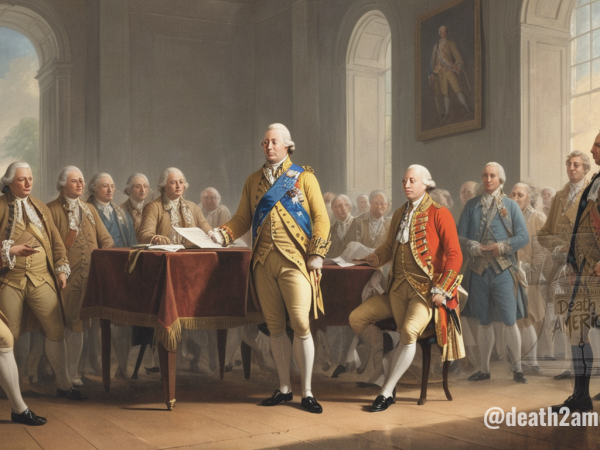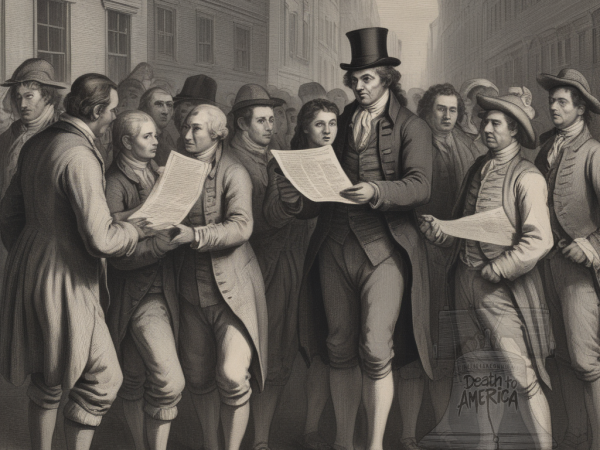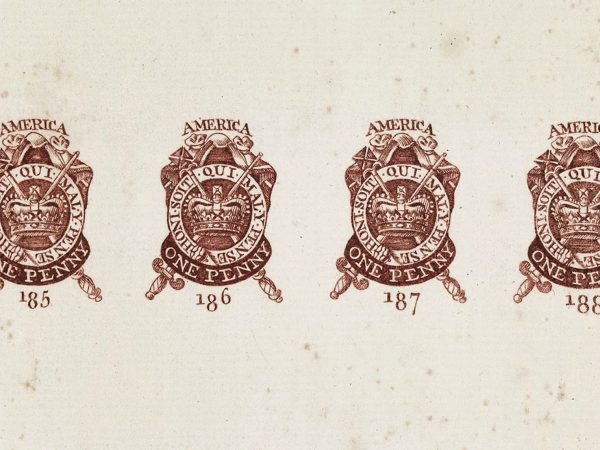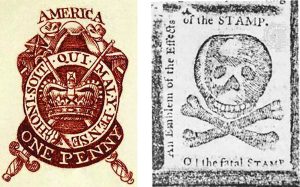-
The Crown’s First Fence October 7, 1763

Proclamation of 1763
Issued by King George III following the French and Indian War, this proclamation prohibited colonial settlement west of the Appalachian Mountains and reserved the land for Native American tribes.This was an early infringement on the colonists’ natural right to property and liberty, as articulated by John Locke and later embraced by the Founders. The British Crown’s centralized authority curtailed economic freedom by restricting settlers’ ability to claim and cultivate land, a right the Founders would see as inherent. It fueled resentment, showing how distant governance ignored local needs, a precursor to later federal overreach. The policy was propagandized as maintaining peace, but it prioritized imperial control over individual agency. -
Sweet Chains of Tyranny April 5, 1764

Sugar Act
The Sugar Act of 1764, also known as the American Revenue Act, was a British law passed to raise revenue from the American colonies by taxing sugar, molasses, and other goods and to combat smuggling. It set the stage for colonial resistance and protests that would later lead to the American Revolution.
Parliament raised duties on sugar and imports to fund the British military presence, cracking down on smuggling.
-
Paper Chains March 22, 1765

Stamp Act
In 1765, the British Parliament passed the Stamp Act, a direct tax on the American colonies. The Act required a tax stamp on various documents and printed materials, sparking widespread colonial resistance and protests due to the lack of colonial representation in Parliament.
The British authority enforced the required tax stamps on colonial paper goods.

-
Troops at Your Table March 24, 1765
Quartering Act
Forced colonists to house and supply British troops in their homes.
-
Duty's Dominion June 29, 1767
Townshend Acts
Imposed duties on tea, glass, and other imports, funding colonial governors.
-
Harbor Lockdown March 31, 1774
Boston Port Act
Closed Boston’s port as punishment for the Tea Party, under the Intolerable Acts.
-
Coercive Chains May 20, 1774
Intolerable Acts
Series of laws strengthening British control, including martial law in Massachusetts.
-
Loose Ties Tighten November 15, 1777
Articles of Confederation
Adopted a weak central government, but laid groundwork for federal expansion.
-
Rebellion's Ruin February 4, 1787
Shays’ Rebellion Suppression
Federal response to farmer uprising over taxes foreshadowed stronger government.
-
Framers' Faustian Bargain May 25, 1787
Constitutional Convention
Created a stronger federal government, debated by Anti-Federalists fearing overreach.
-
Banking on Power February 25, 1791
National Bank Charter
Washington signed Hamilton’s plan for a national bank to manage debt and currency.
-
Spirits of Oppression March 3, 1791
Whiskey Tax
Hamilton’s excise tax on distilled spirits provoked the Whiskey Rebellion.
-
Atlantic Accord's Cost November 19, 1794
Jay Treaty
Trade agreement with Britain, criticized for favoring British interests.
-
Seas of Supremacy July 7, 1798
Quasi-War Naval Expansion
Increased naval funding and power during undeclared war with France.
-
Silencing the Sovereign July 14, 1798
Alien and Sedition Acts
Federalist laws criminalized criticism and expanded deportation powers.
-
Gavel's Growth February 24, 1803
Marbury v. Madison
Established judicial review, expanding Supreme Court’s authority.
-
Land Grab Liberty April 30, 1803
Louisiana Purchase
Jefferson’s $15 million deal doubled U.S. territory without clear constitutional basis.
-
Trade's Tombstone December 22, 1807
Embargo Act of 1807
Banned foreign trade to pressure Britain and France, devastating merchants.
-
Ports Half-Shut March 1, 1809
Non-Intercourse Act
Replaced Embargo Act, still restricted trade with Britain and France.
-
Drums of Dominion June 18, 1812
War of 1812 Declaration
Congress declared war on Britain, centralizing military authority.
-
Yankee Yoke December 15, 1814
Hartford Convention
New England Federalists opposed war, hinting at secession over federal overreach.
-
Protection's Price April 27, 1816
Tariff of 1816
Protective tariff on imports to boost U.S. industry.
-
Slavery's Scales March 3, 1820
Missouri Compromise
Regulated slavery in new territories, balancing free and slave states.
-
Hemisphere's Herald December 2, 1823
Monroe Doctrine
Declared Western Hemisphere off-limits to European colonization.
-
Trail of Tyranny May 28, 1830
Indian Removal Act
Authorized forced relocation of Native tribes, signed by Jackson.
-
Banking Battle July 10, 1832
Bank War (Veto)
Jackson vetoed Second Bank renewal, shifting funds to state banks.
-
Tariff's Tempest November 24, 1832
Nullification Crisis
South Carolina resisted federal tariffs, prompting Jackson’s force threat.
-
Coin's Collapse July 11, 1836
Specie Circular
Required land purchases in gold/silver, crashing economy.
-
Panic's Power Grab May 10, 1837
Panic of 1837 Response
Federal interventions followed economic crash.
-
Destiny's Dominion May 13, 1846
Mexican-American War
War expanded U.S. territory, driven by Manifest Destiny.
-
Union's Uneasy Bargain September 9, 1850
Compromise of 1850
Admitted California, strengthened fugitive slave laws.
-
Chains of Compliance September 18, 1850
Fugitive Slave Act of 1850
Mandated citizens assist in capturing escaped slaves, part of Compromise.
-
Bleeding Borders May 30, 1854
Kansas-Nebraska Act
Allowed territories to vote on slavery, sparking violence.
-
Justice's Jailer March 6, 1857
Dred Scott Decision
Ruled slaves weren’t citizens, Congress couldn’t ban slavery in territories.
-
Duty's Dominion Redux March 2, 1861
Morrill Tariff
Raised duties to protect industry during Civil War prep.
-
Land's Leash May 20, 1862
Homestead Act
Offered federal land to settlers, with conditions.
-
Freedom's Fiat January 1, 1863
Emancipation Proclamation
Freed slaves in rebel states, issued by Lincoln.
-
Money's Master February 25, 1863
National Banking Act
Created a uniform currency, regulated banks.
-
Conscription's Call March 3, 1863
Civil War Draft
Mandated military service, enforced by Lincoln.
-
South's Subjugation March 2, 1867
Reconstruction Acts
Imposed military rule on Southern states post-Civil War.
-
Rights and Rulers July 9, 1868
14th Amendment
Granted citizenship, equal protection, but expanded federal oversight.
-
Butchers' Burden April 14, 1873
Slaughter-House Cases
Limited economic rights under 14th Amendment.
-
Tracks of Tyranny February 4, 1887
Interstate Commerce Act
Regulated railroads, creating the ICC.
-
Trust's Tether July 2, 1890
Sherman Antitrust Act
Banned monopolies, but vaguely grew federal business control.
-
Segregation's Stamp May 18, 1896
Plessy v. Ferguson
Upheld segregation, endorsing ‘separate but equal.’
-
Empire's Echo April 25, 1898
Spanish-American War
War with Spain expanded U.S. overseas territories.
-
China's Checkpoint September 6, 1899
Open Door Policy
Pushed equal trade access in China, formalized U.S. influence.
-
Golden Gilded Cage March 14, 1900
Gold Standard Act
Fixed currency to gold, limiting monetary flexibility.
-
Purity's Price June 30, 1906
Pure Food and Drug Act
Regulated food and drugs, creating FDA precursor.
-
Pocketbook Plunder February 3, 1913
Income Tax (16th Amendment)
Authorized direct income tax without apportionment.
-
Bankers' Bastion December 23, 1913
Federal Reserve Act
Created a central banking system to control money supply.
-
Commerce's Collar October 15, 1914
Clayton Antitrust Act
Strengthened antitrust laws, regulating business practices.
-
Duty's Draft May 18, 1917
World War I Draft
Mandated military service for war effort.
-
Words in Chains June 15, 1917
Espionage Act
Criminalized interference with war effort, suppressed speech.
-
Silence's Sentence May 16, 1918
Sedition Act of 1918
Banned disloyal speech during World War I.
-
Dry Dominion January 16, 1919
Prohibition (18th Amendment)
Banned alcohol production and sale nationwide.
-
Booze Ban's Boot October 28, 1919
Volstead Act
Enforced Prohibition with federal agents.
-
Fear's Fist November 7, 1919
Red Scare Raids
Mass arrests of suspected radicals under Palmer.
-
Fields Fettered May 12, 1933
Agricultural Adjustment Act
Paid farmers to reduce crops, managed agriculture.
-
Valley's Vassal May 18, 1933
Tennessee Valley Authority
FDR’s agency controlled regional power and land.
-
Industry's Iron Hand June 16, 1933
National Industrial Recovery Act
Regulated industry, set wages/prices under New Deal.
-
Labor's Leverage July 5, 1935
Wagner Act
Protected unions, mandated collective bargaining.
-
Safety Net Shackles August 14, 1935
New Deal (Social Security Act)
Mandated contributions for old-age insurance.
-
Work's Warden June 25, 1938
Fair Labor Standards Act
Set minimum wage, hours, child labor rules.
-
Arsenal's Arm March 11, 1941
Lend-Lease Act
Allowed FDR to aid Allies, bypassing neutrality.
-
Camps of Caution February 19, 1942
World War II Internment
Interned Japanese-Americans, citing security.
-
Cold War's Call March 12, 1947
Truman Doctrine
Pledged aid to resist communism globally.
-
Union's Umbilical June 23, 1947
Taft-Hartley Act
Restricted union power, mandated oversight.
-
Security's Shadow July 26, 1947
National Security Act
Created CIA, NSA, centralized defense.
-
Europe's Entitlement April 3, 1948
Marshall Plan
Funded European recovery, expanding U.S. influence.
-
Red Scare's Reign February 9, 1950
McCarthy Hearings
Senate probed communism, fueled by propaganda.
-
Korea's Command June 25, 1950
Korean War Mobilization
Truman sent troops without Congress’s declaration.
-
Roads of Rulership June 29, 1956
Interstate Highway Act
Funded national highways, federalizing infrastructure.
-
Equality's Edict July 2, 1964
Civil Rights Act of 1964
Banned discrimination, enforced by federal agencies.
-
Medicine's Mandate July 30, 1965
Medicare/Medicaid
Created federal healthcare for elderly, poor.
-
Ballot's Boss August 6, 1965
Voting Rights Act
Outlawed voting barriers, federal oversight of elections.
-
Barrel's Bind October 22, 1968
Gun Control Act
Restricted firearms sales post-assassinations.
-
Market's Muzzle August 15, 1971
Nixon Wage/Price Controls
Froze wages and prices to curb inflation.
-
War's Waiver November 7, 1973
War Powers Resolution
Limited presidential war-making, but codified power.
-
Nature's Net December 28, 1973
Endangered Species Act
Protected species, restricting land use.
-
Fuel's Fetters December 22, 1975
Energy Policy and Conservation Act
Regulated energy, created reserves.
-
Sky's Supervisor October 24, 1978
Airline Deregulation Act
Shifted control to federal oversight, mixed impact.
-
Ears of the State October 25, 1978
Foreign Intelligence Surveillance Act
Authorized secret surveillance courts.
-
Cleanup's Cost December 11, 1980
Superfund Act
Taxed industries to clean toxic sites.
-
Deficit's Dictate December 12, 1985
Gramm-Rudman-Hollings Act
Mandated budget cuts, centralized fiscal control.
-
Access's Authority July 26, 1990
Americans with Disabilities Act
Mandated accommodations, enforced by feds.
-
Borderless Bonds December 8, 1992
NAFTA Signing
Trade deal with Canada, Mexico reduced tariffs.
-
Trigger's Tether November 30, 1993
Brady Bill
Imposed background checks, waiting periods for guns.
-
Magazine's Muzzle September 13, 1994
Assault Weapons Ban
Banned certain firearms, magazines.
-
Trade's Tribunal January 1, 1995
WTO Membership
Joined World Trade Organization, binding trade rules.
-
Waves of Watchers February 8, 1996
Telecommunications Act
Consolidated media, federal regulation grew.